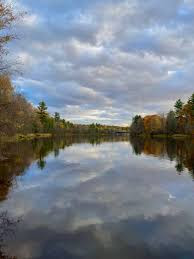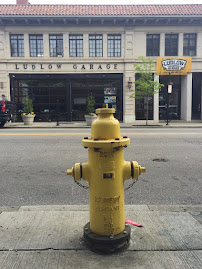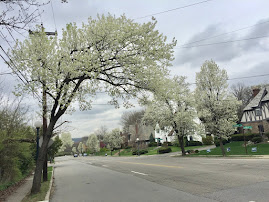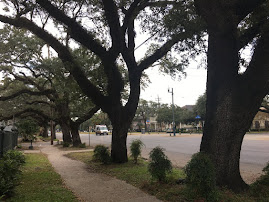Dear
George,
We
performed the annual March ritual of springing forward by setting our clocks
ahead one hour on Sunday morning.
The big day always leaves us a little groggy. We get confused whether our go-to-sleep time of midnight is
really 11 p.m. or 1 a.m., so we sleep sporadically, and then we’re exhausted
when we wake up. Fortunately our
digital cable TV and cell phone clocks reset themselves automatically, but it still
takes us a week to get all our other household clocks aligned correctly. Given so many conflicting signals of
“old time” and “new time” scattered throughout the house, it’s a wonder that we
ever get anywhere on time. Just
this afternoon I told Katja I’d be home at 3:00, but I was an hour off because
the clock in our car was wrong. On
a more elemental level, since I’m a person who craves stability and order in my
life above all else, I find the whole idea of altering time unnerving. If there’s anything in the universe
that ought to be constant and objective, you’d think it would be time. I can hardly believe that Congress,
which can’t get anything else done, can just decide that on March 10th 2:00
a.m. will henceforth be 3:00 a.m.
Mother Nature probably rolls over in her grave.
It
turns out that ancient civilizations were more flexible about time. Typically, the daylight period was
divided into twelve hours, regardless of the season and the length of of days. In ancient Rome, for example, the third
hour after sunrise was 44 minutes long at the winter solstice, but 75 minutes
long at the summer solstice.
Benjamin Franklin is credited as the first person to advocate changing
our use of daylight. As the
American envoy to France, Franklin wrote a satirical essay in 1784 proposing
that Parisians cut back on their use of candles by getting up earlier in the
morning. To assist in the process,
he suggested that church bells be rung and cannons be shot off promptly at
dawn. (6)
A
New Zealand entomologist named George Vernon Hudson in 1895 was the first to
propose a modern version of daylight saving time (hereafter, DST). He wanted to have more daylight leisure
time in which to collect insects.
In 1907 an English outdoorsman and avid golfer named William Willett,
who disliked cutting his golf rounds short at dusk, argued for DST, but the
British parliament failed to follow up on his proposal. (6)
Germany
and its allies were the first countries to actually adopt DST, their aim being
to reduce energy usage and conserve coal in World War I. Britain and its partners soon followed
suit, and the U.S. adopted DST when it entered the war in 1918. DST was repealed in the U.S. in 1919,
then reinstated in World War II until 1945, and finally adopted by Congress in
the Uniform Time Act of 1966.
Arizona (aside from the Navaho Nation) and Hawaii are the only states
that don’t currently observe DST.
Arizona’s reasoning is that, because of excessive summer heat, it’s
worse to prolong daytime hours.
A 2008 Department of Energy study found that electricity use decreases
about 0.5% a day during DST. That
sounds miniscule, but it’s enough to power 122,000 U.S. homes for a year. (1)
Daylight
Saving Time has always been controversial, and arrangements across the country
were a mess for many decades.
Despite being an avid golfer, President Warren G. Harding strongly
opposed daylight saving time and made it voluntary in Washington D.C. in 1922
for private employers but not for federal employees. Needless to say, Harding's policy created chaos, and the
practice was subsequently terminated.
(3) In the 1950s and 1960s
every U.S. community could choose for itself when to begin and end DST. My home town of Menominee and its twin
city of Marinette operated on different summer times, and we regularly crossed
the river to do some shopping, only to find the stores closed. On a bigger scale, Boston, New York,
and Philadelphia found themselves on different times than Washington D.C.,
Cleveland, and Baltimore. Bus
passengers from Steubenville, OH, to Moundsville, WV, had to change their
watches seven times in the space of 35 miles. The situation led to millions of dollars in costs to various
businesses and industries. Extra
railroad timetables all by themselves cost over $12 million a year. (5)
People
cite many advantages of DST, e.g., more daylight to do outdoor chores,
socialize or do recreational activities, and spend outdoor time with children
after work, as well as reducing electricity usage, traffic accidents, and crime
(since criminals like darkness).
(4) DST has generally been
favored by retailers, outdoor sports enthusiasts, and tourism interests. Farmers dislike it because their
animals don’t observe it and they have to get up early anyway. One Internet discussant
also adds, “That extra hr. of sun just burns my garden up in the
summertime." (2) That’s
a serious problem, though there’s something iffy about the logic. DST also has negative effects on
prime-time TV ratings, drive-ins, movie theater attendance, and other evening
entertainment. Bar patrons sometimes get upset when they lose an hour of
drinking time on the night that DST springs forward. In 1997 in Athens, OH, home of Ohio University, over
1000 students and other late night partiers chanted “Freedom” as they threw
liquor bottles at the mounted horse patrol police who were attempting to
control rioting when the bars closed early. (5)
Despite
my minor misgivings, we ourselves love Daylight Saving Time. It is a Whoopee Doopee time. That’s not because of energy
conservation, crime, Dairy Queen hours, or the tourism industry. By March we’ve had it with the
seemingly endless stretch of bleak, dark days. Shifting to Daylight Saving Time symbolizes the beginning of
Spring and happier days. In particular,
it makes for more evening outings with the sheepdogs. That, in turn, makes the world a better place for the dogs,
the people, and the neighborhood at large. Happy DST!
Love,
Dave
SOURCES:
(1) www.abcnews.go.com,
“Daylight Saving Time 3013: 5 Things You didn’t Know”; (2) www.gowilkes.com,
"Daylight Savings Time - For Or Against"; (3)
www.science.howstuffworks.com, "How Daylight Saving Time Works"; (4)
www.timeanddate.com, "The Never-ending Daylight Saving Debate"; (5) www.webexhibits.org, “Daylight Saving
Time: Incidents and Anecdotes”; (6) www.wikipedia.org,
“Daylight Saving Time”
G-mail Comments
-Linda C (3-11): The first
week of dst makes me nuts, by a week I'm fine, but I spend a lot of time saying
" if I get up at 8am is it really 7 am or 9 am?



































































































































































































